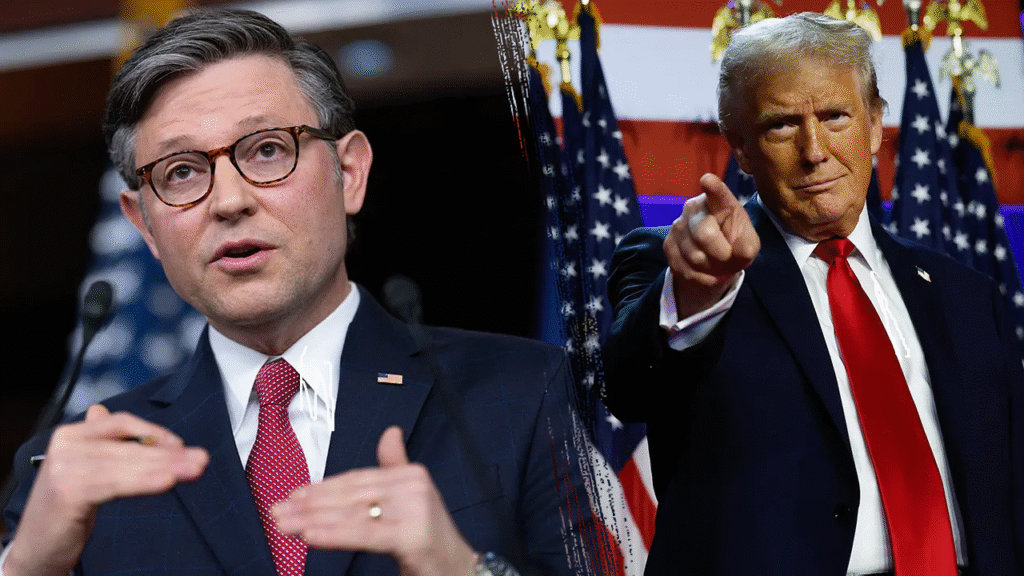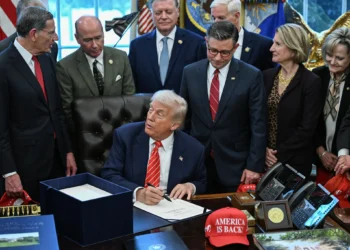Johnson finds himself in a familiar dilemma as Trump’s Policy Bill hangs in the balance.
The speaker’s efforts to get his party’s massive domestic Trump policy bill through the legislature were just the latest in a series of near-death legislative experiences.
On Wednesday, Speaker Mike Johnson was in a similar situation: he was on the verge of failing as he tried to persuade the regular holdouts in his party, and at the end of the day, he had to rely on President Trump himself to push the bill through to completion and advance his agenda.
For Mr. Johnson, this formula has proven successful in the past. Despite his inexperience and the distrust he inspires in some rank-and-file Republicans, who privately believe he is in over his head, he has used it to overcome a number of difficult challenges.

The Republican Conference, which is severely split under Mr. Johnson, is characterized by mini-rebellions always breaking out, the bill always teetering on the verge of collapse, the margins always being too narrow, and more difficulties constantly threatening the process’s next step.
Frequently, in order to crush them, Mr. Trump holds meetings in the White House, where he occasionally presents pictures from the Oval Office or signs goods to formalize the agreement. On Wednesday Mr. Johnson was attempting to quell numerous rebellions inside his party and bring the G.O.P.’s flagship bill, which would reduce taxes and social safety net programs, to a floor vote.
“This entire procedure has been based on the notion that this will happen, no matter how difficult the road,” stated Brendan Buck, a former senior advisor to Republican House Speakers John A Boehner and Paul D.Ryan. And this will happen, someway, somehow. And when it does, Donald Trump will deserve all the praise for being the force behind the speaker’s shoulder, while Mike Johnson will deserve all the credit in the world for maintaining an even keel.
Trump has served as both the bully and the flatterer. That technique has produced positive outcomes.
“It’s cool that the president knows my first name, I dig that,” said Representative Tim Burchett, a Tennessee Republican with a hard-line stance, in March, right before he caved and voted in favor of Mr. Trump’s budget proposal, which he had previously opposed. After leaving yet another meeting with Mr. Trump on Wednesday, Mr. Burchett, one of many ultraconservatives voicing reservations about passing the domestic policy legislation, appeared elated in a video he shared on social media.
“The president was great, as always,” he said. “He told me that he enjoys seeing me on TV, which is kind of cool because he’s both knowledgeable and amusing.”
“Hopefully, we get this thing worked out,” he said.
In March Mr. Johnson was able to pass legislation to finance the government and avert a shutdown, which worked out well for him. Mr. Trump, who consistently opposes omnibus expenditure legislation, capitulated to extremists like Mr. Burchett, who said they will vote “yes” in order for him to continue destroying the federal government.

Then, at the White House, Mr. Trump spoke directly to members of the far-right House Freedom Caucus to promote the bill.
In an effort to win over a conservative faction that was once again threatening to derail his agenda, Mr. Trump engaged in the same behavior on Wednesday. Additionally, he seemed to have a fruitful conversation with members of the Main Street Caucus, who are worried about reductions to Medicaid.
“In that meeting, the president convinced a lot of members to ‘yes,’ and he is the finest closer in the industry,” Republican Representative Dusty Johnson of South Dakota said on Wednesday upon his return to the Capitol.
Mr. Johnson appeared to be on the verge of a humiliating defeat last February, but he was able to successfully get a Republican budget resolution through the House. This was a crucial first step in his attempt to expedite the passage of the legislation through the House on Wednesday.
Republican leaders attempted to quell a rebellion among conservatives demanding greater spending reductions prior to its passage. They canceled the budget vote and then changed course minutes later, calling lawmakers to call the roll. Everything is fine since it received approval.

Despite strong Democratic opposition, Mr. Johnson was able to push through Mr. Trump’s extensive domestic policy plan once more in May. He successfully struck a compromise between the concerns of center-leaning lawmakers, who were concerned about the bill’s total cost and pushed for restrictions on reductions to Medicaid and nutrition, and the concerns of conservatives, who were worried about the overall cost of the bill.
While numerous factions also went to the White House to meet with Mr. Trump on Wednesday, Mr. Johnson was holed up at the Capitol discussing with members who had concerns about rubber-stamping a significantly different product that the Senate had sent back to them, one with more severe Medicaid cuts and a far bigger increase in the national debt.
It was the biggest test the speaker had ever faced. In the past Mr. Johnson and undecided legislators could always argue that they would try to remedy the bill or lessen its negative consequences at the next stage of the legislative process.
However a vote on the bill’s final passage would signal the conclusion of a long process. Furthermore Mr. Johnson was unable to make any adjustments to persuade holdouts, since any changes would send it back to the Senate for protracted discussions, perhaps bringing the whole endeavor to a standstill.

Mr. Johnson was still attempting to employ the same tactic of making promises for future improvements.
“This is only one step and a series of events,” Mr. Johnson stated in an interview with Fox News anchor Sean Hannity on Tuesday night. “We are planning to undertake more reconciliation work. For each fiscal year, you may make a reconciliation budget.
Additionally, he stated that Republicans would seek additional expenditure reductions later in the year.
“We are the party to bring the government back to fiscal sanity,” he. said.
































